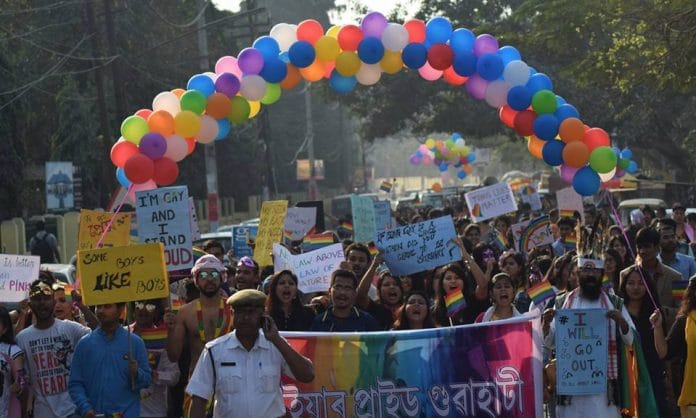A 5-judge SC bench differed on how to approach the case even as BJP-led central govt is yet to make its position clear on Section 377.
New Delhi: The constitutionality of Section 377 must be decided first and then the question of individual rights could follow, Chief Justice of India Dipak Misra said Tuesday as a constitution bench began hearing appeals against criminalising homosexuality.
Besides Misra, the constitution bench includes justices Rohinton Nariman, A.M. Khanwilkar, D.Y. Chandrachud and Indu Malhotra.
While Chandrachud observed that a declaration by the constitution bench should not be confined to just declaring Section 377 constitutional or not, CJI Misra said the constitutionality of Section 377 must be decided first.
“The question here is whether Section 377 of the IPC is ultra vires or not. Let us get out of this mess first,” the bench said.
“We cannot now give an advance ruling on questions like inheritance to live-in partners, whether they can marry, etc. Those are individual issues we cannot pre-judge now,” it said.
The pending plea in the Naz Foundation case — wherein the apex court had overturned the Delhi High Court judgment decriminalising gay sex — was not up for discussion.
Arguing for the rights of the LGBTQ community, senior advocate Mukul Rohatgi sought to increase the scope and ambit of the arguments to include personal rights. The Centre, represented by additional solicitor general (ASG) Tushar Mehta, disagreed saying that the issue must be confined to merely decriminalising Section 377.
Drama in the courtroom
The mood in the courtroom was one of excitement as petitioners Ritu Dalmia, Ayesha Kapur and Sunil Mehra mingled with IIT students and alumni representing the LGBT community of IIT, who witnessed the proceedings with bated breath. Anjali Gopalan from the Naz Foundation was also present.
Rohatgi argued that further directions were needed to protect life and property of homosexuals in this country. The struggle was about the basic constitutional and human rights of a large section of the society.
“This (Section 377) impacts how one looks at the sexual minority of the society,” he argued. The prevalence of this section makes the “sexual minorities” feel like “unconvicted felons” Rohatgi added. People look at you differently, he added.
“Constitutional morality has to overtake societal perception. Don’t blame the society because we all have grown up with this provision in the statute,” he added.
The former attorney general submitted that issues of gender and sexual orientation should not be mixed up. “It’s not a matter of choice that you are gay. It is something innate, you are born with it. Therefore, you act in a way which is different from the majority of your sex,” Rohatgi said.
After Rohatgi’s arguments, senior advocate Arvind Datar — representing Navtej Singh Johar, one of the petitioners — suggested that one cannot have “a right to sexual orientation without having the right to choose a partner.”
To this, referring to the judgment in the Hadiya matter, Chandrachud said: “In Hadiya judgment, we recognised the right to choose a partner to come under Article 21 (right to life). So a ‘partner’ can also be a same sex partner.”
Ambiguity over Centre’s stand
Through the day, both senior advocates Rohatgi and Datar stressed that the BJP-led central government never challenged the verdict of the Delhi High Court. This meant that, in principle, they accepted reading down of the impugned section.
The government has not yet stated its position even though some BJP members have made statements on Section 377 in the past. In fact, the Centre had on 9 July sought to defer the hearing since it wanted time to file its response to the batch of appeals.
What the case is all about
Emboldened by the historic apex court judgment that declared privacy as a fundamental right in 2017, celebrities and prominent personalities had filed a batch of pleas seeking to assert their right and choice of sexual orientation.
Celebrity chef Ritu Dalmia, Bharatanatyam exponent Navtej Singh Johar, journalist Sunil Mehra, businesswoman Ayesha Kapur and writer-historian Aman Nath filed a plea in June 2016 seeking that the colonial-era law be quashed.
On 23 April this year, hotelier Keshav Suri joined the group, filing another plea on the matter.






